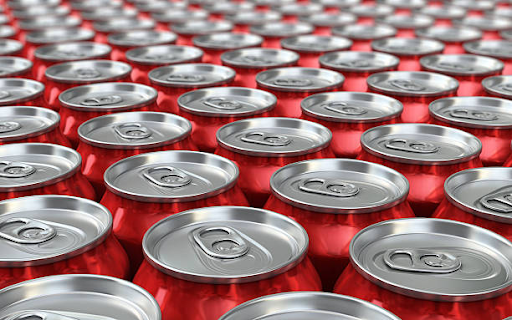Coke and diet cock are carbonated soft drinks manufactured by the Coca-Cola Company. Coke was initially marketed as a temperance drink and intended as a patent medicine.
The drink's name refers to its original ingredients: coca leaves and kola nuts. The current formula of Coca-Cola remains a trade secret; however, a variety of reported recipes and experimental recreations have been published.
The drink has inspired imitators and created a classification of other soft drinks.
In this article, we shall be sharing the difference between coke and diet coke using the healthy and unhealthy benefits of these sodas.
The Coca-Cola Company is a total beverage company, offering different brands, from sodas to waters, from coffees to teas, from juices to kombuchas.
The Origin of Coke
Coca-Cola originated in 1886 by an Atlanta pharmacist, John S. Pemberton, at his Pemberton Chemical Company. Frank Robinson, his bookkeeper, chose the name for the drink, and it became the Coca-Cola trademark.
Coke was bought out by businessman Asa Griggs Candler, whose marketing tactics led Coca-Cola to dominate the world soft-drink market throughout.
Chemist John Pemberton of Atlanta, Georgia, invented the formula of a dark fizzy concoction he named "Coca-Cola" in 1886. However, Coke didn't take off until almost ten years later, when a Mississippi businessman found a way to bottle the drink, as well as secure a trademark and design for the famous Coke bottle.
The Origin of Diet Coke
The Coca-Cola Company introduced Diet Coke to great fanfare in 1982, following another low-calorie cola called Tab produced in 1963.
Although Tab was successful in the growing weight and calorie-conscious market, its name referring to “keeping a tab on your weight,” the company’s field tests and research on consumer attitudes indicated that its lack of the Coca-Cola trademark limited sales. The company began developing a different diet cola to replace Tab from 1975, which would have a renewed brand image and respond to the demand for a diet drink with better taste.
Company technicians managed to develop a new, smoother flavor with less phosphoric acid under the slogan, “Just for the taste of it, Diet Coke!”
Artificial sweeteners as a cheaper substitute for cane sugar saved the company around $100 million a year. The company president, Roberto Goizueta, had decided that high-fructose corn syrup would be used in regular Coke by 1980, suppressing the company’s internal tensions between preserving and altering the original formula.
In 1983 the company began using aspartame as the artificial sweetener for Diet Coke, initially blending it with saccharin.
Although the FDA had just approved aspartame in 1981 and its effects on human health and beverage shelf-life were still contested, Coca-Cola soon began using it as the primary sweetener due to its better taste. Moving away from the sugar market allowed the company to establish Diet Coke as a new product called for bottlers who purchased the syrup formula to sign new contracts.
The previous agreement had only specified concentrates containing sugar, and coke executives held that neither Diet Coke nor regular Coke containing corn syrup was applied to them.
Amendments in the contract offered by Coca-Cola would allow the company to control syrup prices. Despite protests from bottlers, the company won the legal battle in 1989, and Diet Coke was named as a new brand with fresh ingredients and new contracts.
Sales grew, aided by the design decision to make the label silver and making the product more visible on the shelves, and by 1983 it had become the largest-selling soft drink in the U.S. –according to Wikipedia.
Other Brands of Coca-cola Company
Different brands of the Coca-Cola beverage includes the following drinks below:
Aquarius
Ayaka green tea
Chivita
Ciel water
Costa Coffee
Dasani waters
Del Valle juices and nectars
Fairlife
Fanta
Fresca
Fuze Tea
Georgia coffee
Gold Peak teas and coffees
Honest Tea
ALOHA
innocent smoothies and juices
Minute Maid juices
Powerade sports drinks
Simply juices
Schweppes
SmartWater
Sprite
Topo Chico
Vitamin water
Healthy Benefits of Coke
Here are a few health benefits of drinking coke and other soda drink;
1. Easy digestion
Scientists and doctors have discovered that one of the best treatments for gastric phytobezoar, a condition where a person has difficulty with food moving through their digestive tract and suffers stomach blockages, is a glass of Coca-Cola.
2. Focus your mind
Because it is a caffeinated drink, coke offers a good whack of the stimulant caffeine. Immediately the caffeine enters your bloodstream, it sparks increased concentration and mental focus, so if your attention levels are dipping, a mouthful or two of Coke could get you back to speed.
4. Stop nausea
There are many assumptions on this, but many people vouch for a glass of coke when settling an upset stomach and eliminating nausea.
Unhealthy Benefits of Taking Coke
While coke is sweetened with sugar, it comes with its risks. Let's discuss a few;
Obesity
It's probably not news to you that drinking coke and other soda drinks have been linked to obesity. This may be partially due to the types of high-calorie foods that tend to accompany sodas drinks; a can of soda contains 140 calories but is almost sure to be of no help when it comes to your hunger.
Diabetes
Think changing to diet coke is doing you any favors in your blood sugar? Then, you need a rethink! Both regular and diet coke have been linked to an increase in type 2 diabetes. The sugar you get from soda forces the body to transform that sugar into fat in your liver.
Tooth Decay
A single 12-ounce can of soda contains almost ten packets of sugar, coating your teeth and gums every time you crack open a can. Multiple studies have shown just how harmful soda can be to your teeth; left in soda for sufficient time, human teeth will dissolve.
Those aches and pains that won't go away might just be getting worse every time you put a sugary soda in your shopping cart. The American Journal of Clinical Nutrition suggests that women who regularly consume sugar-sweetened soda have an increased risk of rheumatoid arthritis, so there's no time like the present to cut soda from your diet.
Kidney stones store minerals in the kidneys over time, which pass through the urethra. Unfortunately, those with regular soda habits are at risk for this unpleasant condition; excessive sugar consumption and dehydration are associated with an increased risk of kidney stones.
Heart Failure
You can keep your heart healthy by giving up your soda habit today. The British Medical Journal advises that drinking sweetened sodas may contribute to heart failure, and your risk for heart failure is closely associated with diabetes, obesity, and uncontrolled blood pressure, all of which have been linked to the regular consumption of sodas and other sugary drinks.
Stroke
Your risk for stroke increases with taking excess soda. Soda is directly responsible for increased fat stores in the body, some of which can cause the hardening of your arteries, including the ones close to your brain, increasing your stroke risk.
High Cholesterol
Devote to lower cholesterol and longer life by reducing coke and another soda intake from your diet today. A single can of coke has more sugar than you need in an entire day, and research published in the Journal of the American Medical Association suggests that a diet rich in sugar is linked to high levels of LDL, or "bad" cholesterol, and low levels of HDL, also known as "good" cholesterol.
Certain citrus sodas contain brominated vegetable oil, also known as BVO, an additive that maintains soda's flavor and appearance. This ingredient has been linked to infertility and early onset puberty, so if you're eager to have biological children in the future, it's never too soon to stop your soda habit.
Migraines
Sodas are loaded with sweeteners of both the artificial and natural varieties, both of which are known to trigger migraine headaches.
Dehydration
The caffeine in many sodas has a diuretic effect, causing dehydration if you don't adequately supplement with extra water. Over time, this can lead to a slower metabolic rate, electrolyte imbalances, water retention, and even heart arrhythmia.
Allergies
Your soda habit could be the reason for your excessive sneezing; highly allergenic sodium benzoate has been removed in many sodas, only replaced by potassium benzoate. Unfortunately, this is no benefit to allergy sufferers: both have been linked to hives and asthma.
Non-Alcoholic Fatty Liver Disease
Drinking alcohol isn't the only way you're harming the health of your liver. The excess sugars in sodas have been linked to non-alcoholic fatty liver disease. Because sodas contain an excessive amount of sweetener, the body cannot adequately process it, turning it into fat in the liver.
Blurred Vision
Your poor vision could be the result of your soda habit. Drinking soda causes your blood sugar to change rapidly, which may cause the lenses of your eyes to swell, impacting your vision.
Ulcers
If you're struggling with digestive ulcers, your soda habit may be a contributing factor to your ache. Both caffeine and carbonation can contribute to the irritation of your stomach lining, putting you at greater risk for ulcers and making those you already have worse.
Health Benefits of Diet Coke
There are several documented health effects of diet coke which includes;
May reduce fatty liver.
Some studies have shown that replacing regular coke with diet coke can reduce fat around the liver.
READ ALSO: Say Goodbye to Diabetes: Discover Easy and Natural Home Remedies for a Healthier Life
No increase in reflux.
Despite anecdotal reports, carbonated drinks have not been reported to worsen heartburn. However, more experimented pieces are needed.
No strong links to cancer.
Most research has no evidence that diet Coke causes cancer even though a slight increase in lymphoma and multiple myeloma in men was reported, but the results were weak.
Changes to the gut microbiome.
Artificial sweeteners may alter the gut flora, leading to reduced blood sugar control and potentially increasing the risk of type 2 diabetes. One study found that all six tested artificial sweeteners damaged the gut microbiome in various ways. Another found that people’s gut flora reacted to artificial sweeteners was highly individualized.
Unhealthy Benefits of Taking Diet Coke
Increased Risk of Osteoporosis.
Diet and regular cola is linked with bone mineral density loss in women, but not in men. The caffeine and phosphorus in cola might infringe on normal calcium absorption.
Tooth decay.
Like regular coke, diet coke is associated with dental decay due to its acidic pH level. This comes from adding acids, such as malic, citric, or phosphoric acid, for flavor.
It is linked to depression.
Observational research has found higher rates of depression among those who drank four or more diets or regular sodas per day. However, this is subject to more experiments.
Summary
There is not much Difference Between Coke and Diet Coke as both healthy and unhealthy benefits are slightly related.
All observations are subject to more findings; for a better healthy lifestyle, it would help if your intake of coke and diet coke is reduced.
















Follow us